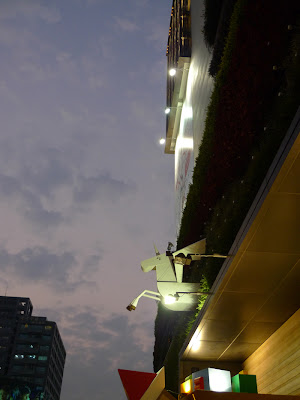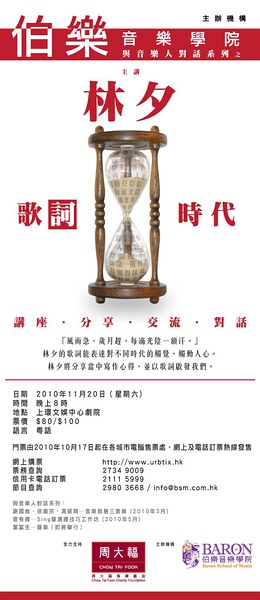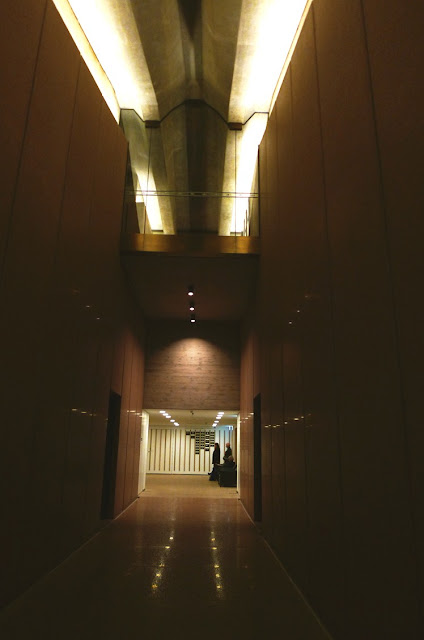Thursday 30 December 2010
Monday 20 December 2010
The Grand Daddy of Hong Kong Lyrics Writer: Lin Xi (林夕)
It was an eye opening experience to hear the talk presented by Lin Xi (林夕) on lyrics writing. The talk was enlightening as much as thought provoking, it was worth the $100 my wife paid the extra ticket for me to join the event.
The publicity material of the talk. (Note that it was sponsored by Baron School of Music from where a course on lyrics writing, taught by Lin Xi, was scheduled for enrolment soon afterwards.)
The title of the talk: Lyrics - Epoch, was attractive enough to draw in audiences. It was widely known that Lin has business acumen, and the full house proved this point. As the talk gradually demonstrated itself that the subject of "epoch" was all but lacking. Lin further revealed to discerning eyes that he had done little preparation for the talk. The content had no focus. There was nothing new in his speech. His talk on lyrics was all skin deep and jumpy from the 1970s to 80s, and from the contemporary period back to 90s.
He quoted lyrics and the development of writing throughout the heydays of Cantopop repeatedly around the best known songs of Sam Hui (許冠傑), Faye Wong (王菲) and Eason Chan (陳奕信). Every other local guy in Hong Kong could have done this level of talk as he did. Understandingly but perhaps unforgivably, he kept falling back to finance and investment catch-phrases when talking about lyrics writing. It was not a surprise that the entire duration of talk was at times frivolous, at times incomprehensible. To dare repeating myself, he was often quoted as a very active property and stock market investor. One can understand his stream of thoughts and communication habits hack back to these interests.
He quoted lyrics and the development of writing throughout the heydays of Cantopop repeatedly around the best known songs of Sam Hui (許冠傑), Faye Wong (王菲) and Eason Chan (陳奕信). Every other local guy in Hong Kong could have done this level of talk as he did. Understandingly but perhaps unforgivably, he kept falling back to finance and investment catch-phrases when talking about lyrics writing. It was not a surprise that the entire duration of talk was at times frivolous, at times incomprehensible. To dare repeating myself, he was often quoted as a very active property and stock market investor. One can understand his stream of thoughts and communication habits hack back to these interests.
When the talk eventually came to the end, I praised goodness for this. Maybe he did as well. It was followed by a question and answer session. A few questions were raised by supporters on the meaning of particular lyrics he did for some songs. There was nothing wrong if these audiences had their own views in the first place. What was disturbing was the fact that they asked Lin to give them his "official" meaning behind the lyrics. As such, it appeared that his dawning of light would settle their confused minds.
One elder gentleman challenged if Lin could produce better lyrics on the grand concept of ‘love’. He did not hesitate to recite a few of his
verses most audience had waited long enough to hear. Though a bit muddled,
another overwhelming round of applause was ensured.
Given the unbearable air of uncritical question and answer session up to this point, I borrowed the microphone and asked Lin if he had monopolized the lyrics writing industry. (Mind you Lin was in the business from the mid 80s up to now, it is not exaggerated he wrote for most singers and in most albums!) For my abrupt question, he was hesitant for seconds, murmuring a little and replied that monopoly had to be systematic, organized, the minorities was unfairly treated... I have explained that he had the knack of explaining things by using business and investment catch-phrases.
I did not ask him further questions. I just wanted him to know that there are people in this city who were not happy with his overwhelming amount of outputs and the music industry in general. Yes he was not the culprit of the flawed music industry in Hong Kong. The true monopolisers are the four major music/entertainment companies in the city. They control and systemically exert influences on all aspect of popular music businesses including exclusive contract rights of singers, song and lyrics writers, music production and publishing, etc. Furthermore, they have friendly business interests in radio, TV, Karaoke and concert organizing companies. In simple terms, these companies and people behind are the exclusive players that shape the current mindless, puppy-love Cantopop culture.
The money generated from the music industry is big. These few companies benefit most from the HK pop music market. The beefier slice of dosh actually comes from media sponsorship. All well known singers appear in commercials and other forms of advertisement. Almost invariably, most of them are actors and actress in movies in Hong Kong and China. All of these are money generators that have synergy effects among each other. This is where the real money is. This is also how and why the music industry in this city is so rotten in recent years.
Labels:
Music
Sunday 19 December 2010
Three Erhu Concert Reviews
As if erhu had gained sudden recognition to become a major musical instrument, there were three notable erhu concerts in Hong Kong in December 2010. The concerts were centred around three major erhu players, who have longed been popularly regarded as masters of the instrument. This often abused crowning of the word "master" whether on music, art, performers in the city is alarming. However, without such naming, attentions to reviews from readers are less focused, or that any writer might be seen as disrespectful. Therefore, here we are, following the practice at least to get more attention, talking about concerts of erhu masters.
Xiao's concert programme.
Of the three musicians, let's begin with Xiao Bai-yong (蕭白鏞). The concert was hosted by Hou Shih-chien (霍世潔), his ex-wife and once student, who also played a title in sub-standard level with her students. This understandably clocked in higher attandance rate that evening. Apart from this interference, Xiao played 14 titles including 7 with yexing and 1 with piano, whilst all others as solo. The repetiore played was written by Liu Tian-hua (劉天華) and Hua Yan-jun (華彥鈞-阿炳), two very important erhu writers in the first half of the last century.
Xiao's control of the instrument was flawless and exceptionally fluent. With his demeanour consistently inert, it demonstrated his exceptional skills and control of the instrument. Although lacking in spark and rather clinical at times, his performance was definitely musical and very engagement up to his last stroke of the bow.
Wong On-yuen (黃安源), Wong Sun-tat (黃晨達) concert leaflet and programme.
Wong On-yuen (黃安源) and his son Wong Sun-tat (黃晨達) played at Nan Lian Garden. The venue, Xuan Hai Xuan (香海軒), could only house a few hundred audiences but it was well decorated in restrained oriental style and the atmosphere for holding concert was excellent.
Like Xiao Bai-yong, the concert was based on erhu classics and traditional canons. There were solo performances by both players and group performances with pipa musician Yu Jia (俞嘉). Wong On-yuen played beautifully and strong with musical characters. There were soft lyrical string plays and driving outbursts that touched the human heart from his performance. Wong Sun-tat also played a significant role in the concert with 2 titles on his own. However, Torrents of River (江河水) was performed without conviction and was rash at times. His version of Reflections of the Moon on the Waters (二泉映月) was superficial on interpretation of sadness and self-pity. Wong the junior even concocted unwanted noise from bow accidentally touching the string at the end of play. It was registered on his face that he was not pleased with his own performance. One would understand that his father's achievement is difficult to surpass, a mountain almost insurmountable. The concert ended in three rounds of applause, quite common in Hong Kong, not necessarily expressing appreciation of music but anticipation of extra performances. To most audience's surprise, encore was not to be forthcoming.
Xu Ke (許可) concert leaflet and programme.
The third concert, held in the same venue above, was performed by Xu Ke (許可). The programme had thoughtful selection of traditional pieces, lesser known titles related to the earthy northern region of China and a short piece by Xu. The mixture had an aura of rural living, one can almost smell an air of countryside and voices of ethnic peoples through the cunning play of erhu. The miming of animal noises, cheesy at times in other Chinese music performances, was restrained yet colourful enough.
Xu's play on the whole was relaxed but truly masterful, a class of his own. A few songs are worthy of mention. Never have I heard Reflections of the Moon on the Waters (二泉映月) played in a slight but noticeable upbeat pace. Why not, since the song was at times played by its original blind author in improvised fashion while peddling merchandises on the streets. This tune was used as a means to attract business. It was only a popular false impression that the tune required an expression of self-pitiness. Xu's version was levels ahead of play by Wong. Xu's own works Enjoy the Country (鄉間喜悅) was rich in texture and fluid in its short duration. It is noted that Xu's deliberately setting of the nut (qianjin 千斤) much higher than usual erhu musicians facilitates wider range of notes to be played. This clearly benefited the rich expressions of sound but on the other hand exceptional skills is required. Apart from the music, he captivated the audience with his gentle swinging movement. It was a convincing demonstration of confidence, dedication and self fulfillment.
As an end note, it had been a great joy to hear Wang Wen-li (王文禮) on yangqin that complimented Xu's erhu on the duo plays. The sound of yangqin was never as beautiful in full scale orchestral performances. The duet was a seamless combination like a breath of fresh air. It reminded one of European chamber music set in perfect harmony with the venue.
Listen to Xu Ke playing Czardas and be convinced (do not be distracted by his outfit):
Xu Ke (許可) and Wang Wen-li (王文禮) at meet-the-artist session after the concert.
The concert set in the beautiful venue of Xuan Hai Xuan (香海軒).
Typical animated gesture of Xu Ke (許可) that captures attention.
Labels:
Music
Thursday 16 December 2010
Understated Interiors of Sydney Opera House
A few interiors of the famous building, not often publicized, are posted below for sharing. The authority has planned to re-model the concert hall in 2011 according to the unfinished sketches by the architect – Jørn Utzon. Hence some of the spaces below, however successful they might have been, may disappear.
The official tour guide of the architecture,
as if showing us a cathedral, was self-admittedly solemn and proud
during the entirety of the tour. Her professional attitude was impressive;
yet it is somewhat dangerous to treat a civic building with the highest of esteem
as this national monument. Governments around the world would spend
fortunes to commission expensive and high profiled buildings with the aim to boost
national images, some subtle whilst others more blatant. Examples
are plentiful, Paris under Mitterrand, Dubai cityscape, Beijing Olympics 2008,
to name but a few.
Steps connecting various performance spaces reminiscent of winding Medieval streets.
Access to the concert hall with glimpses of the harbour.
Concert hall to be re-modelled according to the
original sketches by Utzon.
Cavernous passageway with the famous concrete
shell structures above.
Strategically glazed pre-concerte area capturing
the harbour view at sunset.
Labels:
Interior Design
Subscribe to:
Posts (Atom)




















































